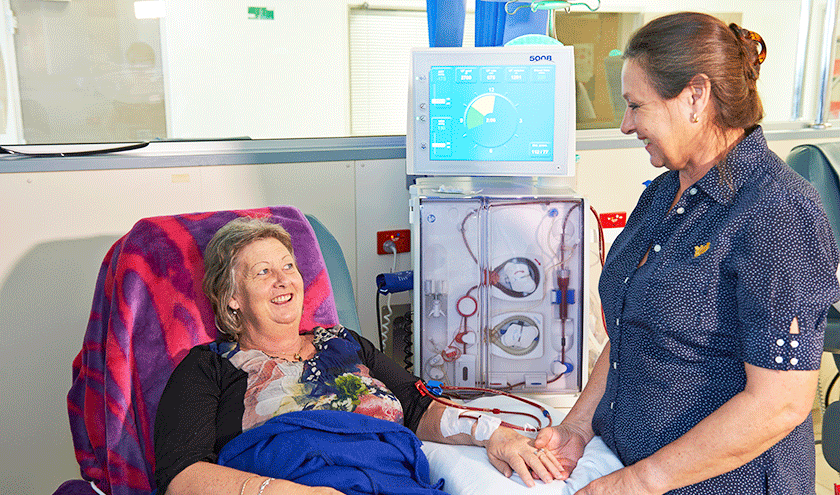- Our services
- Medical and surgical
- Renal dialysis
Renal dialysis
Renal dialysis is a treatment that helps your kidneys continue to function when they have stopped working properly. It removes salt and waste from your body, maintains a safe level of chemicals in your blood and keeps your blood pressure in check.

Some people need renal dialysis for a short time while others need dialysis for end-stage kidney failure and continue treatment for the rest of their lives.
Dialysis can impact your day-to-day life, however our caregivers work with you to ensure your treatment allows you to live a full and active life and that the treatment is done at the most suitable time and place for you.
Our renal dialysis services
Our nephrologists, urologists, dietitians, registered nurses and allied health professionals work together to minimise the effects of kidney failure. We provide access to the latest dialysis technology so you can live as full a life as possible.
Types of renal dialysis
There are two types of renal dialysis: haemodialysis and peritoneal dialysis.
Haemodialysis
Haemodialysis happens outside the body. It involves pumping blood from your bloodstream into a machine (dialyser) that filters waste and excess water, then pumps the filtered blood back into your bloodstream. The process takes about four to five hours, and is done at least three times per week. It should not be painful.
Before you can begin haemodialysis, you will need surgery to create a vascular access to allow access to your bloodstream. This can often be done as day surgery. Your doctor will talk to you about the most suitable vascular access for you, and how to care for it.
Peritoneal dialysis
Peritoneal dialysis happens inside your body. It uses the membrane in your peritoneal (abdominal) cavity to filter your blood. A soft tube called a catheter is surgically inserted into your abdomen. One end of the tube sticks out of your body so it can be connected to a bag containing a special fluid called dialysate. Waste products are drawn out of your blood into the dialysate and then removed, in what is known as an exchange.
There are two types of peritoneal dialysis.
- Continuous ambulatory peritoneal dialysis (CAPD) takes about 30 minutes and is done about four times each day. You can do each exchange yourself by connecting, draining and replacing the bag of fluid.
- Automated peritoneal dialysis (APD) takes about eight to 10 hours and is done while you sleep. A machine does several exchanges overnight, then during the day the fluid is left inside your body.
We provide information and education about the process and their options so you can choose the type of dialysis treatment that is best suited to you.
Costs and fee payment options
If you have private health insurance, the costs for your hospital stay and specialist fees may be covered by your health fund, based on your level of cover.
If you don’t have private health insurance, you can access treatment at a St John of God Health Care hospital through our self-funded care option.
When you use your private health insurance, you get benefits that include access to St John of God Health Care private hospital facilities, your choice of specialist, minimal wait times, and with an eligible policy most of your hospital costs can be covered by your private health insurance fund.
You should contact your health insurer to understand your level of cover, and whether your policy is subject to additional fees such as a hospital excess or other ‘out-of-pocket’ expenses. Your health insurer will also be able to assist in understanding if you will have doctor, radiology and pathology out-of-pocket costs.
Patients who don’t have private health insurance can choose to access St John of God Health Care private hospital services and treatments by paying fees themselves.
By accessing our self-funded care option, you’ll be able to avoid wait times and have your surgery or treatment with your choice of specialist at a St John of God Health Care private hospital.
- Learn more and enquire about the self-funded care option.
- Call 1300 940 199 to get a quote for self-funded treatment.
If you have received an invoice for an expense associated with treatment from a St John of God Health Care service you can pay your bill online.
You may be interested in...
Where we provide this service...
